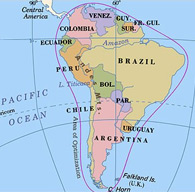The following is an excerpt from the AFP. For the full article, follow the link at the end of the page.

Buenos Aires, known for its active if low-key gay movement, became the region's first city to approve civil unions for gay couples in 2002. It was followed by Villa Carlos Paz in the north and the southern province of Rio Negro.
Those civil unions grant gay couples some, but not all, the rights enjoyed by heterosexual married couples.
Friday's ruling by Judge Gabriela Seijas ordered the civil registry to make official the marriage of Alejandro Freyre, 39, and Jose Maria Di Bello, 41, who had been denied their request because they were both men.
It could increase pressure for lawmakers to take up a stalled gay marriage bill in Congress.
...
In the rest of Latin America, Mexico City, the Mexican state of Coahuila and the Brazilian state of Rio Grande do Sul also allow civil unions for same-sex couples.
Uruguay became the first country in the region in late 2007 to legalize civil unions for gays. In January 2009, the Colombian Constitutional Court recognized a series of rights for homosexual couples, including social welfare rights.
Meanwhile, CNN reported last Friday that:
The government of Argentina's capital will not appeal a court decision this week that legalizes same-sex marriage, Buenos Aires Mayor Mauricio Macri said Friday.
The court ruled that two articles in the city's civil code that say only people of different sexes can get married are illegal. The court decision applies only to Buenos Aires. Same-sex unions in most of the rest of Argentina remain illegal.











 Printable Version
Printable Version










Reader's Comments
Más la luz!
Congratulations!
More lights for LGBT!
1JAPAN tribe steward : tokyofit
http://www.fridae.com/tribe:494/1japan
C'est un petit pas pour le Buenos Aires, mais il faudra attendre pour la legalization du mariage gay pour toute l'Argentine.
All the best for the gays and lesbians in Argentine!!
Well done to the judiciary in Argentina, you have come far from the dark days of the dictator!
Bueno suerte.
going there in January with my Polo team
its my dream to get married to a hot Argentina Polo Player and travel the world playing Polo, but gotta get my handicap level up to a +1 now to make it happen
Usually the court in Singapore doesn't act against the will of the ruling party. But in the case of 377a, it's another story. There is no incentive for the ruling party to guard it. It's even declaring that it's not going to enforce it proactively. So if the court legalizes gay sex, it's not acting against the will of the ruling party, but just that of those conservative people who are against homosexuality.
There is a recent article at Channelnewsasia ( http://www.channelnewsasia.com/stories/singaporelocalnews/view/440540/1/.html ) that I thought is very revealing. If we read between the lines of the Law Minister's speech, we may be able to sort out what's really in their heads.
I quote: " But he said that while the government will not take the lead in repealing the law, the legal courts in Singapore have the power to decide how Section 377 is interpreted and applied...... "
The key phrases to note are:
1) "will not take the lead in"
2) "legal courts in Singapore have the power to decide"
My analysis:
1) The ruling party, being dependent on voters, "will not take the lead in" repealing 377a because many of its voters are against homosexuality, so repealing it is an unpopular move that cannot be justified;
2) The judiciary, being independent of voters and being the other possible branch than the parliament that has the power to legalise gay sex, is a better choice between the two to make this unpopular decision.
And this makes sense. If the court is the one making the decision, it has nothing to do with the ruling party or Cabinet. The conservative people including the fundamentalists who are unhappy with this decision can't blame or punish the government for a decision not made by it. And there's nothing these angry voters can do to punish the court, which doesn't need their votes. The result, which is the legalisation of gay sex between consenting male adults, is the same. But the political cost is different. So, why should the ruling party be the one to make this decision?
We must understand that, as of now, there is no compelling reason for the government to repeal 377a. They haven't, or perhaps cannot, see any urgent need to do so. This law affects a small % of their voters. So it's certainly doesn't pay to suffer any political cost by repealing 377a, which will offend the conservative voters.
So, I thought the activists should try another approach. If we can't do it through the Parliament, why not try the court, like what the Indians and the Australians had done? This move, if successful, doesn't cost any political price to the ruling party. Of course, I don't suggest we give up petitioning to the Parliament. What I suggest is we try more approaches. Don't restrict our options.
To do it successfully through the court, the activists need a team of legal experts (preferably in Constitutional Law, Philosophy of Law and Law of Evidence), two or more victims (of 377a), and preferably an expert in Mass Communication (to play the sympathy card cleverly to counter the aggression from the fundamentalists). Experts in public health, sexual health, psychiatry, psychology and education would be able to help also. If necessary, foreigners, preferably those who had been proven to suffer under such laws by foreign courts, may also be asked to testify in our court to prove that such laws had caused harm to them.
Please log in to use this feature.